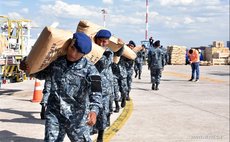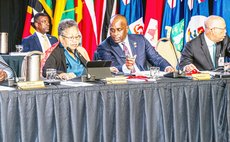Gun Control - 1
The buying, selling and possession of firearms and ammunition, their use, carriage and discharge in public and their manufacture, importation and exportation are governed by the Firearms Act, Chap. 15:31 of the revised Laws of the Commonwealth of Dominica. This piece of legislation was enacted in 1973 to replace the Firearms Ordinance passed in 1965; and it has been subsequently amended in 1975, 1982, 1985 and 1990. According to the Act:-
• A firearm is described as any deadly weapon containing a barrel from which ammunition can be discharged, or any weapon, the use of which is banned under the law. It also includes any component part of such a weapon or any attachment (such as, for example, a silencer) designed to reduce the noise or flash caused by firing the weapon. Air rifles, air guns and certain kinds of air pistols are not regarded as firearms.
• Ammunition includes the whole or a part of a shell, cartridge case, bomb, hand-grenade, bullet, or other such missile, whether or not these things contain any explosive, gas or chemical, and whether or not they were intended to be fired from any gun or instrument from which such objects can be released. A missile used for the sole purpose of putting out fires is not considered to be ammunition. Neither is a fuse which may be used to fire or explode a shell, bomb, hand-grenade, bullet or such other missile considered to be ammunition. • A person may buy, borrow, hire or accept a firearm or ammunition as a gift or have it in his or her possession, only if that person has obtained a firearm user's licence. Application for such a licence must be made to the Commissioner of Police. The Commissioner has discretion to grant or not grant a licence. A person found guilty of doing these things without having obtained a licence is liable to a fine of $6,000.00 or two years' imprisonment in a Magistrate's Court, or to imprisonment for five years, in the High Court.
• Where a person is proven to have had anything whatsoever in his or her possession or under his or her control, and any firearm or ammunition is found in or on that thing, the person, unless he or she can prove otherwise, will be held to have been in possession of that firearm or ammunition.
• No person other than a police officer or a customs officer may have a prohibited weapon in his or her possession. A person who contravenes this provision is liable in a Magistrate's Court to a fine of $15,000.00 and two years' imprisonment or, in the High Court, to five years' imprisonment. Prohibited weapons include (a) any cannon, mortar, instrument used to send a flame for any distance or automatic firearm, (b) any grenade, bomb or such missile, and (c) any weapon made to discharge any harmful liquid, gas or other thing.
• It is not required that the following persons, among selected others, obtain a firearm user's licence: (a) a police or customs officer, if the firearm or ammunition is Government property; (b) a person holding a firearm dealer's licence, acting in the ordinary course of business; (c) a licensed gunsmith acting in the ordinary course of business; (d) a person taking part in a play or in a television film who has the firearm or ammunition in his or her possession for the purpose of the performance; (e) a starter at an athletic meeting; and (f) members of a registered rifle club. But the theatre or television actor, the starter and the rifle club member must beforehand obtain written permission from the Commissioner to have the firearm and/or ammunition for that purpose.
• It is an offence for any person, other than a police officer, a customs officer or a member of a registered rifle club, to carry any firearm or ammunition in public. Such a person, if convicted of so doing in a Magistrate's Court, is liable to a fine of $6,000.00 or to two years' imprisonment.
• A person who sells or "transfers" a firearm or ammunition to any other person who does not hold or is not exempt from holding a user's licence, is guilty of an offence, punishable in a Magistrate's Court by a fine of $6,000.00 or two years' imprisonment or, in the High Court, by five years' imprisonment. The word "transfer" includes letting, hiring, giving, lending or parting with possession.
• It is an offence for any person to sell or transfer a firearm or ammunition to any other person whom he or she knows or has reason to believe to be (a) drunk, under the influence of drugs or of unsound mind, (b) otherwise unfit to be given charge of such firearm or ammunition at the time of the sale or transfer, and (c) less than 18 years of age. The penalty, on conviction in a Magistrate's Court, is a fine of $6,000.00 or two years' imprisonment. It is also an offence punishable by the same fine or term in prison for a person to repair or test such firearm or ammunition for any of the above mentioned class of persons.
• Whosoever has a firearm or ammunition in his or her possession, or under his or her control, in the State of Dominica, intending to sell or transfer same to another person in the State for the purpose of committing a crime, is liable, if found guilty in a Magistrate's Court, to a fine of $15,000.00 and to two years' imprisonment or, in the High Court, to five years' imprisonment.
• Where any firearm or ammunition is found in any ship, vessel, aircraft or other means of conveyance in the State "including in particular its territorial waters," (a) the ship, vessel, aircraft or other means of conveyance may be seized by any customs or police officer, and (b) the Master or person in control shall be deemed to be guilty of an offence, unless it is proven that the firearm or ammunition was aboard without his or her consent, knowledge or connivance, and that reasonable steps were taken to prevent commission of the offence.
• No offence will have been committed if the ship's manifest shows that the arms or ammunition have been properly consigned to importers in Dominica or elsewhere, or are the ship's bona fide stores in the custody of the proper officer.
• There will be neither an offence nor a seizure in case the conveyance in question belongs to the Air Force or Navy of any other State, and duly authorised permission has been granted to enter the island's territorial waters.
Copyright © William Para Riviere, August 2013




